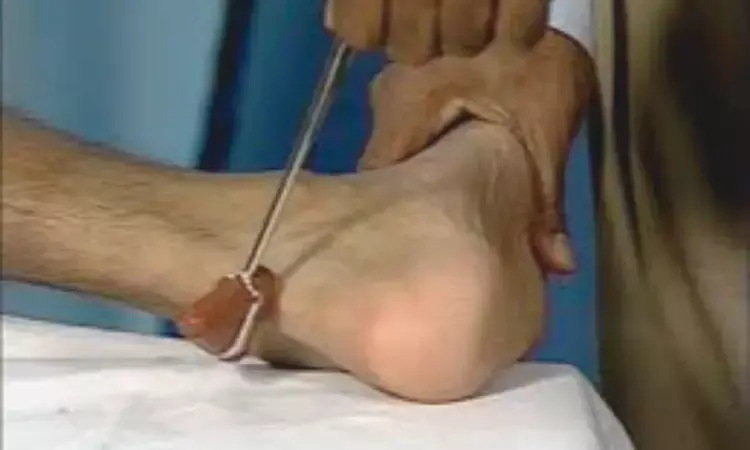- Home
- Medical news & Guidelines
- Anesthesiology
- Cardiology and CTVS
- Critical Care
- Dentistry
- Dermatology
- Diabetes and Endocrinology
- ENT
- Gastroenterology
- Medicine
- Nephrology
- Neurology
- Obstretics-Gynaecology
- Oncology
- Ophthalmology
- Orthopaedics
- Pediatrics-Neonatology
- Psychiatry
- Pulmonology
- Radiology
- Surgery
- Urology
- Laboratory Medicine
- Diet
- Nursing
- Paramedical
- Physiotherapy
- Health news
- Fact Check
- Bone Health Fact Check
- Brain Health Fact Check
- Cancer Related Fact Check
- Child Care Fact Check
- Dental and oral health fact check
- Diabetes and metabolic health fact check
- Diet and Nutrition Fact Check
- Eye and ENT Care Fact Check
- Fitness fact check
- Gut health fact check
- Heart health fact check
- Kidney health fact check
- Medical education fact check
- Men's health fact check
- Respiratory fact check
- Skin and hair care fact check
- Vaccine and Immunization fact check
- Women's health fact check
- AYUSH
- State News
- Andaman and Nicobar Islands
- Andhra Pradesh
- Arunachal Pradesh
- Assam
- Bihar
- Chandigarh
- Chattisgarh
- Dadra and Nagar Haveli
- Daman and Diu
- Delhi
- Goa
- Gujarat
- Haryana
- Himachal Pradesh
- Jammu & Kashmir
- Jharkhand
- Karnataka
- Kerala
- Ladakh
- Lakshadweep
- Madhya Pradesh
- Maharashtra
- Manipur
- Meghalaya
- Mizoram
- Nagaland
- Odisha
- Puducherry
- Punjab
- Rajasthan
- Sikkim
- Tamil Nadu
- Telangana
- Tripura
- Uttar Pradesh
- Uttrakhand
- West Bengal
- Medical Education
- Industry
Study Links Deteriorating Ankle Reflexes to Declining Kidney Function in Type 2 Diabetes Patients

Japan: A recent observational cohort study published in the Journal of Diabetes Investigation has found a significant link between the deterioration of ankle reflexes and reduced kidney function in individuals with type 2 diabetes. This study highlights the potential of using simple neurological assessments, such as ankle reflex tests, as indicators of kidney health in diabetic patients, adding a new dimension to routine diabetic care.
"A reduction or absence of ankle reflexes is strongly and independently linked to a decline in estimated glomerular filtration rate (eGFR) in patients with type 2 diabetes," the researchers reported.
Akifumi Kushiyama, Department of Pharmacotherapy, Meiji Pharmaceutical University, Kiyose City, Tokyo, Japan, and colleagues aimed to examine the association between the ankle reflex and the eGFR in patients with type 2 diabetes.
For this purpose, the researchers conducted a single-center, retrospective, observational cohort study, including 1,387 patients who underwent an ankle reflex examination between January 2005 and December 2015. The ankle reflex results were categorized into three groups: normal, decreased, and absent.
The primary outcome was a 40% reduction in eGFR from baseline. To assess the relationship between ankle reflex findings and eGFR loss, the researchers employed survival time analysis using the Kaplan–Meier method and regression analysis with a Cox proportional hazards model.
The findings of the study can be summarized as follows:
• Ankle reflex test results:
• Normal: 678 patients (48.9%)
• Decreased: 270 patients (19.5%)
• Absent: 439 patients (31.6%)
• The median follow-up period was 5.6 years.
• Univariate regression analysis revealed that decreased and absent ankle reflexes were significantly associated with eGFR loss.
• After adjusting for prognostic risk factors, the hazard ratios (HR) for eGFR loss were:
• Decreased ankle reflex: HR 1.83
• Absent ankle reflex: HR 2.57
The current study identified a connection between ankle reflex abnormalities and eGFR decline in patients with type 2 diabetes. As the severity of ankle reflex impairment increased, the risk of eGFR decline also heightened. Moreover, even after adjusting for potential confounders such as other neurological symptoms, diabetes history, patient background, comorbidities, and medications, the deterioration of ankle reflexes remained independently associated with eGFR decline.
The study had several limitations. First, 1,699 patients were excluded due to the absence of an ankle reflex examination at their initial visit, with the decision to perform the test unclear. Second, the results could have been influenced by variations in the physician’s skill, though experienced specialists conducted the exams. Third, the researchers couldn’t distinguish between diabetic and non-diabetic nephropathy as causes for eGFR decline since kidney biopsies were not performed. Lastly, unknown confounders may have impacted results.
"Despite these limitations, the study found that deterioration of ankle reflexes was an independent risk factor for eGFR decline in type 2 diabetes," the researchers concluded.
Reference:
Muramatsu, T., Yamamuro, D., Kushiyama, A., & Kikuchi, T. Deterioration in ankle reflex is associated with a reduced estimated glomerular filtration rate in patients with type 2 diabetes: A retrospective observational cohort study. Journal of Diabetes Investigation. https://doi.org/10.1111/jdi.14348
Dr Kamal Kant Kohli-MBBS, DTCD- a chest specialist with more than 30 years of practice and a flair for writing clinical articles, Dr Kamal Kant Kohli joined Medical Dialogues as a Chief Editor of Medical News. Besides writing articles, as an editor, he proofreads and verifies all the medical content published on Medical Dialogues including those coming from journals, studies,medical conferences,guidelines etc. Email: drkohli@medicaldialogues.in. Contact no. 011-43720751


